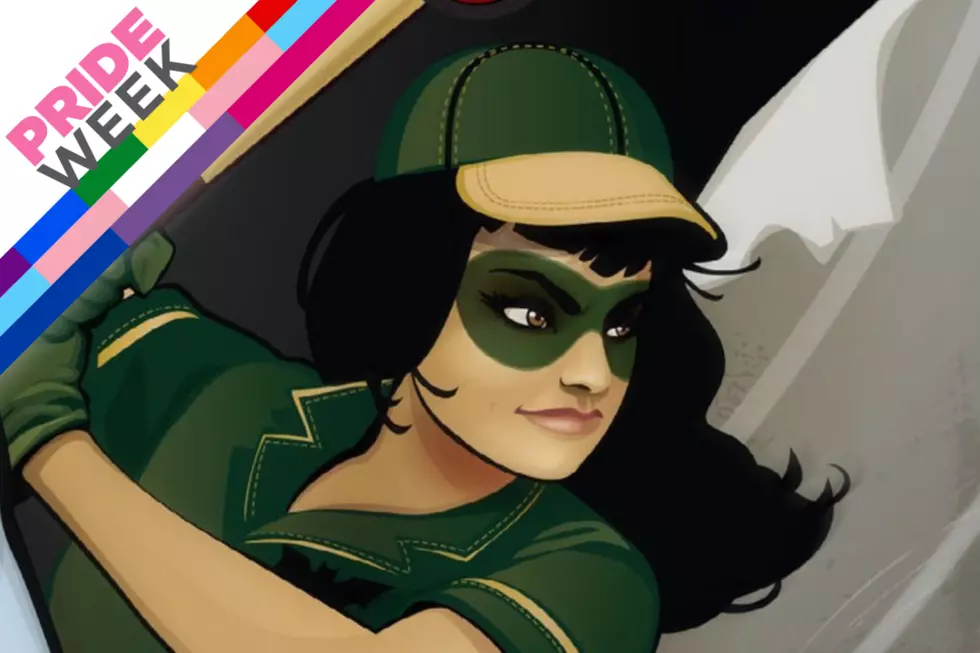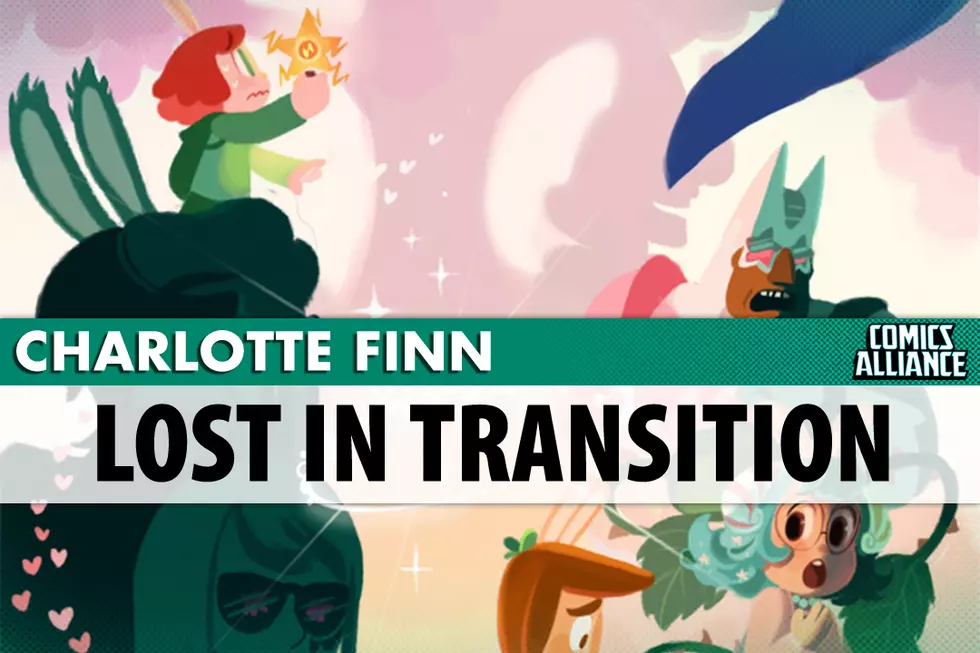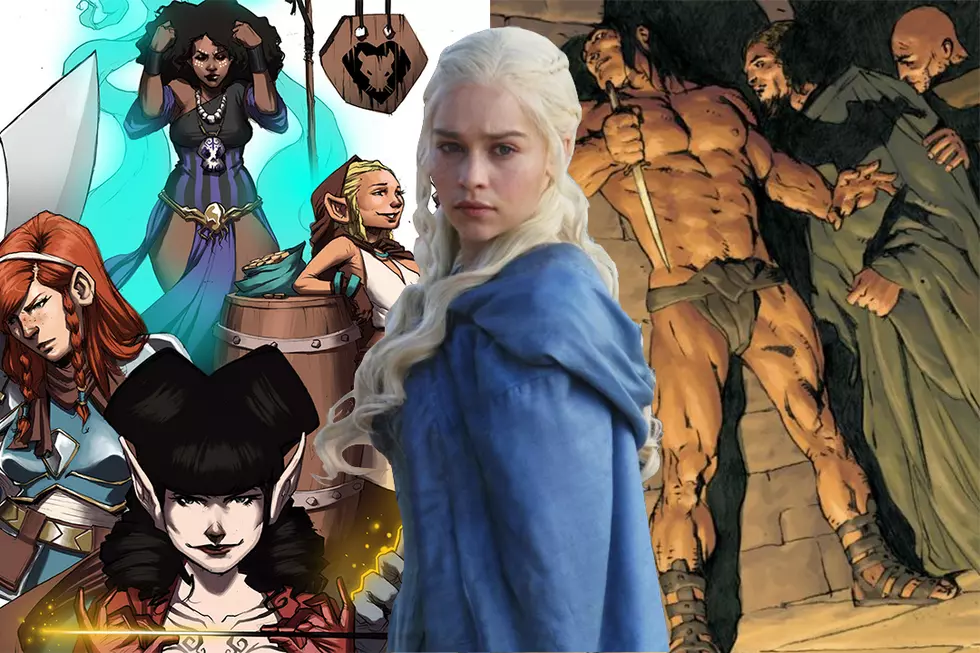
Lost in Transition: ‘Rat Queens Special #1: Braga’
Hi, I’m Charlotte Finn. I’m a lifelong comics fan and last year, I admitted to myself that I was transgender.
Coming out as transgender means reassessing a lot about your life, your place in the world, and what that world's been telling you about yourself before you even realized who you really were. In this occasional series, I’m going to be applying that reassessment to comics that feature people like me, or close to being like me, and look them over with a fresh set of eyes.
Are they good? Are they bad? Are they somehow both, at the same time? In this regular series, I'll offer my thoughts.
Rat Queens Special #1: Braga
- Kurtis J. Wiebe: Writer
- Tess Fowler: Art/Colors/Cover A
- Roc Upchurch: Cover B
- Ed Brisson: Lettering
- Laura Tavishati: Editor
So: I love Dungeons and Dragons.
Okay, it'd be more accurate to say that I love tabletop roleplaying games in general and that I have a list of favorites and that if we're being honest, Dungeons & Dragons isn't in the top five. But tell people that you're into the narrativist play mechanics of the FATE system over more simulationist fare and their eyes roll back in their head like they've been possessed by a challenge rating 8 undead with the incorporeal template. So I just say I'm into D&D. It's easier that way, and it has the benefit of being true.
D&D is part of fantasy, but really, it's its own thing, and too often D&D fiction makes the mistake of being fantasy first and D&D second, failing to evoke the feeling of sitting at the table with your friends and swapping jokes amidst dice rolls and arguments over tactics. One of the shining exceptions is the late, lamented Dungeons and Dragons comic by John Rogers and Andrea Di Vito, and I'm happy that the Image Comics series Rat Queens has stepped into its void while carving out its own identity with i +2 longsword.
Rat Queens is set in a D&D-adjacent world where "adventurer" is a vocation that exists, and mostly consists of cleaning monsters out of conveniently placed underground catacombs, then spending all the money on bar crawls and fines from the town guard. The Rat Queens are an all-female quartet of adventurers who compete with other adventuring companies, and this one-shot special focuses on Braga, the orc member of the Queens' rival group, the Peaches.
Without ever stating it out loud, it's obvious Braga is transgender the moment the flashback begins --- never stated outright in the text, because the art does all the heavy lifting.
The bulk of the issue is an extended flashback to one of the more formative events in Braga's --- then Broog's --- life. Braga is a classic archetype in D&D, the "good" member of the "bad" race, which carries enough questionable racial connotations that it could be its own article. However, it works here, because Braga is from a race that isn't born evil so much as picked it up as a bad habit.
Braga's expected to be crowned the new leader of the orc clan for no other reason than being the firstborn son of the current leader, who is considered unfit for leadership because he's lost an arm. Braga has grown intensely frustrated with the ongoing blood feud with the tribe's neighbors, and with the general state of orc society, and grapples with the decision to stay or to go.
The decisions is made for Braga when her younger brother, planning on exploiting a loophole in the whole "eldest son takes over leadership" succession plan, stages a bloody coup that no one gets out of unscathed. Disgusted with this turn of events, Braga turns her back on her birthright, and is exiled from orc society.
A society that, in this comic, has no women with a speaking role --- except for Braga, who doesn't know it yet.
(Side note – I'm referring to Braga as Braga and as a she, because it's considered appropriate to refer to a transgender person who is out of the closet that way, even when talking about them before they changed their name or started using different pronouns. Think of it as a retcon, only with fewer marriage-eating devils and more endocrinologists.)
There are sympathetic male orcs --- Braga is dating one --- but orc society itself seems based entirely around men. Braga is not just walking away from a violent, grudge-bearing society, but a patriarchal one that's been telling her that men in general, and she specifically, are ascendant without her ever realizing it. In the midst of all that, it's no wonder she doesn't know who she is yet.
All this is communicated quietly and in the background, with no official condemnations of patriarchy in the words Kurtis J. Wiebe writes, but with lots of subtle reinforcement in Tess Fowler's art and in the structure of the comic itself. Fowler is a perfect fit for the book, and it's a pleasant surprise to learn that she's joined the main series full time after the departure of Roc Upchurch and Stjepan Sejic. Her storytelling matches the brutality you get in a world where there's magic healing to sew your mutilated cast members back together, and she communicates the quieter, more emotional beats of the story as well.
Of course, some things you can't walk away from, such as how good you are with a sword, which is why Braga is now an adventurer with the Peaches. Rat Queens is a world where being unspeakably violent is an equal-opportunity occupation, which is not much of a step forward for the cause of pacifism, but is a nice, giant sword-swinging leap for gender equality. Braga is now in a world where there's a place for her, and she loves it. Her chief regret is that things couldn't have been like this back home, an all too familiar story with transgender people.
All of this is framed with a sequence where Braga tells her story to Dave (of the Four Daves, and yes, that's a real adventuring group in Rat Queens). Dave has stayed the night and is curious about her story, and it's interesting to me that she chose this one and not the story about her realizing she was transgender.
It's a welcome change, in many respects. Too often, in fiction, the story about how transgender people realized we were transgender goes from being "an important event in our lives," to "the only event in our lives." A giant conceptual planetoid that all the other parts of ourselves just orbit around. By having this story tied to Braga's eventual self-discovery, but not having it specifically be that self-discovery, it paints Braga as a more fulfilling, well-defined character.
It initially surprised me that the comic skipped over both Braga's revelation about her gender identity and her transition into it, but on reflection, the comic doesn't really need it. Not to say that I wouldn't read that story front to back, but when Braga walks away from orc society, realizing that she's not a match for it, that's the real first step to becoming the woman she is in the main series.
The downside is that Dave, at story's end, is probably in the dark about Braga's nature as a transgender woman --- and while it's 100% Braga's right to keep that to herself, I can't help but worry that this will be set up as some kind of shock reveal down the line, where it really doesn't need to be. Shock reveals are great dramatic devices, but in this case they veer close to being outed, which as the recent controversy with Teen Iceman and Teen Jean Grey shows, is a subject that needs some care in its handling.
But: it's unfair to judge a comic that hasn't come out yet based on my speculations about where it might lead. Rat Queens Special #1 itself, is a good comic.
A large part of being transgender is defining your identity and how you're going to present to the world, and while the analogy isn't one to one, this isn't too far removed from how tabletop RPGs work. A lot of transgender people, yours truly included, used tabletop RPGs as a way of dipping their toes into a different gender identity than the one they've been told to have. There is a long, and somewhat hidden, transgender history in tabletop gaming. I'm glad that the creators behind Rat Queens chose to create Braga to honor it.
More From ComicsAlliance


![Fantastic Five: Best Fantasy Heroes [Fantasy Week]](http://townsquare.media/site/622/files/2016/10/fantasy-five.jpg?w=980&q=75)
![Lost in Transition: ‘Demon Knights’, Shining Knight, And the Power of Clarity [Fantasy Week]](http://townsquare.media/site/622/files/2016/10/lostintransition-demonknigh.jpg?w=980&q=75)





